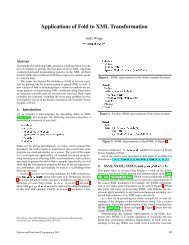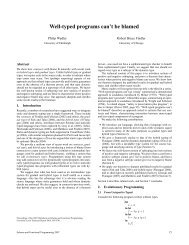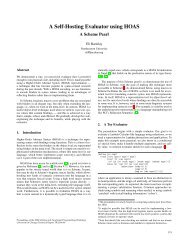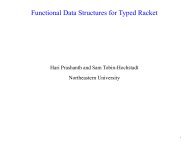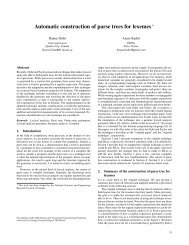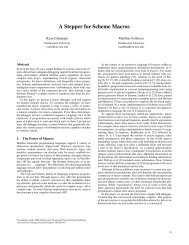2006 Scheme and Functional Programming Papers, University of
2006 Scheme and Functional Programming Papers, University of
2006 Scheme and Functional Programming Papers, University of
Create successful ePaper yourself
Turn your PDF publications into a flip-book with our unique Google optimized e-Paper software.
3. Pseudo-Variadic Relations<br />
Just as a <strong>Scheme</strong> function can be variadic, so can a miniKanren<br />
relation. For example, it is possible to define a variadic<br />
version <strong>of</strong> plus o using <strong>Scheme</strong>’s var-args feature. We must<br />
distinguish between the arguments whose values are to be<br />
added <strong>and</strong> the single argument representing the sum <strong>of</strong> those<br />
values. The simplest solution is to make the first argument<br />
represent the sum.<br />
(define variadic-plus ∗o<br />
(lambda (out . in ∗ )<br />
(plus ∗o in ∗ out)))<br />
(define plus ∗o<br />
(lambda (in ∗ out)<br />
(cond e<br />
((≡ () in ∗ ) (≡ 0 out))<br />
((fresh (a d res)<br />
(≡ (a d) in ∗ )<br />
(plus o a res out)<br />
(plus ∗o d res))))))<br />
Here we use variadic-plus ∗o to find the sum <strong>of</strong> three, four,<br />
<strong>and</strong> two:<br />
(run ∗ (q) (variadic-plus ∗o q 3 4 2)) ⇒ (9)<br />
Let us find the number that, when added to four, one, <strong>and</strong><br />
two, produces nine.<br />
(run ∗ (q) (variadic-plus ∗o 9 4 q 1 2)) ⇒ (2)<br />
variadic-plus ∗o is not as general as it could be, however.<br />
We cannot, for example, use variadic-plus ∗o to find all<br />
sequences <strong>of</strong> numbers that sum to five. This is because in ∗<br />
must be an actual list, <strong>and</strong> cannot be a variable representing<br />
a list. The solution is simple—just use plus ∗o in place <strong>of</strong><br />
variadic-plus ∗o .<br />
plus ∗o , which does not use <strong>Scheme</strong>’s var-args functionality,<br />
takes exactly two arguments. The first argument must be<br />
a list <strong>of</strong> numbers, or a variable representing a list <strong>of</strong> numbers.<br />
The second argument represents the sum <strong>of</strong> the numbers in<br />
the first argument, <strong>and</strong> can be either a number or a variable<br />
representing a number.<br />
Variadic relations, such as variadic-plus ∗o , are defined using<br />
pseudo-variadic helper relations, such as plus ∗o . Henceforth,<br />
we focus exclusively on the more flexible pseudovariadic<br />
relations, keeping in mind that each pseudo-variadic<br />
relation can be paired with a variadic relation.<br />
To add three, four, <strong>and</strong> two using plus ∗o , we write<br />
(run ∗ (q) (plus ∗o (3 4 2) q)) ⇒ (9)<br />
Here is another way to add three, four, <strong>and</strong> two.<br />
(run 1 (q)<br />
(fresh (x y z)<br />
(plus ∗o x q)<br />
(≡ (3 y) x)<br />
(≡ (4 z ) y)<br />
(≡ (2 ()) z))) ⇒ (9)<br />
Instead <strong>of</strong> passing a fully instantiated list <strong>of</strong> numbers as<br />
the first argument to plus ∗o , we pass the fresh variable x—<br />
only afterwards do we instantiate x. Each call to ≡ further<br />
constrains the possible values <strong>of</strong> x, <strong>and</strong> consequently constrains<br />
the possible values <strong>of</strong> q. This technique <strong>of</strong> constraining<br />
the first argument to a pseudo-variadic relation through<br />
repeated calls to ≡ is similar to the partial application <strong>of</strong> a<br />
curried function—the plus ∗o relation can be considered both<br />
curried <strong>and</strong> (pseudo) variadic.<br />
Replacing run 1 with run 2 causes the expression to diverge.<br />
This is because there is no second value to be found.<br />
Although (plus ∗o x q) succeeds an unbounded number <strong>of</strong><br />
times, after each success one <strong>of</strong> the calls to ≡ fails, resulting<br />
in infinitely many failures without a single success, <strong>and</strong><br />
therefore divergence. If the call to plus ∗o is made after the<br />
calls to ≡, the expression terminates even when using run ∗ .<br />
(run ∗ (q)<br />
(fresh (x y z)<br />
(≡ (2 ()) z)<br />
(≡ (3 y) x)<br />
(≡ (4 z ) y)<br />
(plus ∗o x q))) ⇒ (9)<br />
We have also reordered the calls to ≡ to illustrate that<br />
the list associated with x need not be extended in leftto-right<br />
order—this reordering does not affect the behavior<br />
<strong>of</strong> the expression. The three calls to ≡ fully instantiate x;<br />
instead, we could have associated z with a pair whose cdr is<br />
a fresh variable, thereby leaving the variable x only partially<br />
instantiated. By the end <strong>of</strong> section 3, the reader should be<br />
able to predict the effect <strong>of</strong> this change on the behavior <strong>of</strong><br />
the run ∗ expression.<br />
Here is a simpler example—we prove there is no sequence<br />
<strong>of</strong> numbers that begins with five whose sum is three.<br />
(run ∗ (q) (plus ∗o (5 q) 3)) ⇒ ()<br />
Returning to the problem that led us to use plus ∗o , we<br />
generate lists <strong>of</strong> numbers whose sum is five.<br />
(run 10 (q) (plus ∗o q 5)) ⇒<br />
((5)<br />
(5 0)<br />
(5 0 0)<br />
(0 5)<br />
(1 4)<br />
(2 3)<br />
(3 2)<br />
(4 1)<br />
(5 0 0 0)<br />
(5 0 0 0 0))<br />
There are infinitely many values, since a list can contain<br />
arbitrarily many zeros. We will consider the problem <strong>of</strong><br />
generating all lists <strong>of</strong> positive numbers whose sum is five,<br />
but first we introduce a convenient abstraction for defining<br />
pseudo-variadic relations.<br />
3.1 The foldr o Abstraction<br />
We can define certain pseudo-variadic relations using the<br />
foldr o relational abstraction. foldr o is derived from foldr, a<br />
st<strong>and</strong>ard abstraction for defining variadic functions in terms<br />
<strong>of</strong> binary ones [8].<br />
(define foldr<br />
(lambda (f )<br />
(lambda (base-value)<br />
(letrec ((foldr (lambda (in ∗ )<br />
(cond<br />
((null? in ∗ ) base-value)<br />
(else (f (car in ∗ )<br />
(foldr (cdr in ∗ ))))))))<br />
foldr))))<br />
108 <strong>Scheme</strong> <strong>and</strong> <strong>Functional</strong> <strong>Programming</strong>, <strong>2006</strong>




